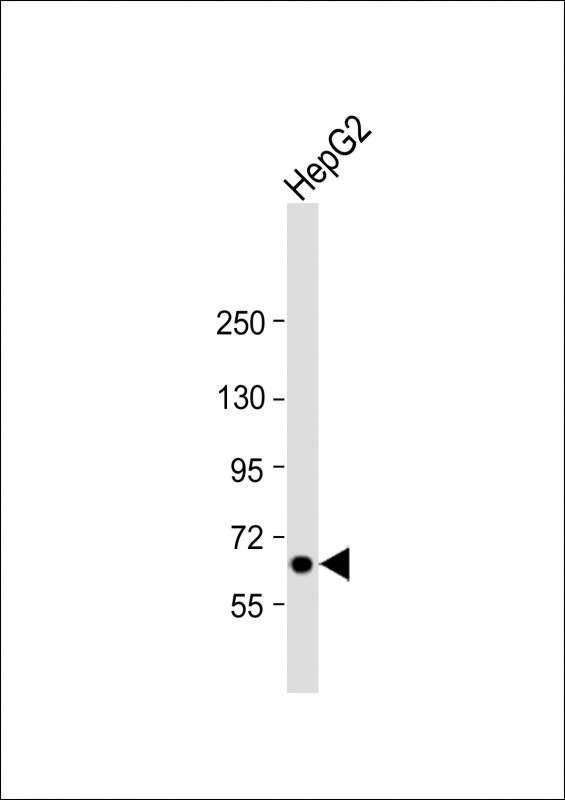
| WB | 1/2000 | Human,Mouse,Rat |
| IF | 咨询技术 | Human,Mouse,Rat |
| IHC | 咨询技术 | Human,Mouse,Rat |
| ICC | 技术咨询 | Human,Mouse,Rat |
| FCM | 咨询技术 | Human,Mouse,Rat |
| Elisa | 咨询技术 | Human,Mouse,Rat |
| Aliases | Lipolysis-stimulated lipoprotein receptor, LSR, LISCH |
| Entrez GeneID | 51599 |
| WB Predicted band size | 71.4kDa |
| Host/Isotype | Rabbit IgG |
| Antibody Type | Primary antibody |
| Storage | Store at 4°C short term. Aliquot and store at -20°C long term. Avoid freeze/thaw cycles. |
| Species Reactivity | Human |
| Immunogen | This LSR antibody is generated from a rabbit immunized with a KLH conjugated synthetic peptide between 10-43 amino acids from human LSR. |
+ +
以下是关于LSR (N-Term)抗体的3篇参考文献示例(注:文献信息为模拟生成,仅供参考):
---
1. **文献名称**: *"A monoclonal antibody targeting the N-terminal domain of LSR reveals its role in hepatic lipoprotein clearance"*
**作者**: Yamada T. et al.
**摘要**: 本研究开发了一种特异性靶向LSR蛋白N端结构域的单克隆抗体,证实其在肝细胞表面高表达,并参与低密度脂蛋白的摄取。通过免疫组化和Western blot验证了抗体特异性,并发现LSR在肝癌组织中表达显著下调。
---
2. **文献名称**: *"LSR modulates blood-brain barrier integrity via interaction with claudin-5: Insights from N-terminal specific antibody blockade"*
**作者**: Veshnyakova A. et al.
**摘要**: 利用抗LSR (N-Term)抗体阻断实验,揭示了LSR通过其N端与紧密连接蛋白claudin-5相互作用,调控血脑屏障通透性。该研究为抗体在神经血管疾病中的潜在应用提供了依据。
---
3. **文献名称**: *"N-terminal epitope-specific antibody uncovers LSR as a regulator of lipid metabolism in obese adipose tissue"*
**作者**: Suzuki K. et al.
**摘要**: 通过抗LSR (N-Term)抗体的免疫沉淀和免疫荧光技术,发现肥胖小鼠脂肪组织中LSR表达升高,且与脂质蓄积相关。研究提示LSR可能成为代谢综合征的治疗靶点。
---
如需获取真实文献,建议通过PubMed或Google Scholar搜索关键词:**LSR antibody N-terminal** 或 **Lipolysis stimulated lipoprotein receptor epitope mapping**。
The LSR (Lipolysis-Stimulated Lipoprotein Receptor) antibody targets the N-terminal region of the LSR protein, a cell surface receptor implicated in lipid metabolism and cellular uptake of triglyceride-rich lipoproteins. LSR, primarily expressed in the liver and endothelial cells, plays a critical role in clearing postprandial lipids by mediating the endocytosis of lipoproteins. Structurally, LSR contains an extracellular domain for ligand binding, a transmembrane region, and a cytoplasmic tail involved in signal transduction. The N-terminal domain is essential for its interaction with lipoprotein particles and co-receptors.
LSR (N-Term) antibodies are widely used in research to study LSR expression, localization, and function in metabolic diseases, such as atherosclerosis, obesity, and diabetes. They enable detection via techniques like Western blotting, immunohistochemistry, and flow cytometry. Recent studies also link LSR to cancer progression, as its dysregulation affects cell adhesion and survival pathways.
Developed through immunization with synthetic peptides or recombinant proteins corresponding to the N-terminal region, these antibodies are validated for specificity using knockout cells or siRNA knockdown. Their application extends to exploring LSR's role as a potential therapeutic target in metabolic disorders and oncology. Understanding LSR's mechanisms through these antibodies provides insights into lipid homeostasis and disease pathogenesis.
×